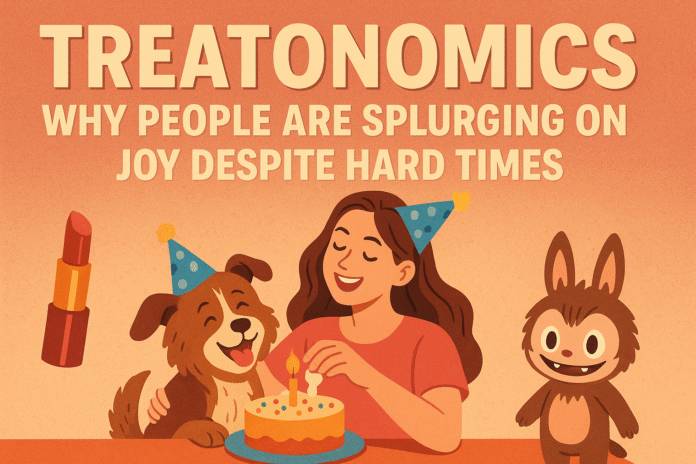
|
Getting your Trinity Audio player ready...
|
In an unpredictable global economy, a powerful spending trend is emerging — Treatonomics. It’s the idea that even when money is tight, people still find ways to indulge in little luxuries and memorable experiences to boost their mood.
From Lipstick to Labubu Dolls
The roots of Treatonomics lie in the famous “Lipstick Effect” — a nearly century-old observation that small luxury purchases, like makeup or perfume, rise during economic downturns.
Today, that concept has evolved. While shoppers are still buying affordable pick-me-ups like candles, home décor, and collectible toys such as Labubu dolls, they’re also investing in big-ticket experiences. From $200 Taylor Swift concert tickets to £1,000 Oasis reunion weekends, people are cutting back on essentials to fund moments that make life feel richer.
Why It’s Happening Now
Persistent inflation, high interest rates, and slower job growth have left many feeling that traditional milestones — marriage, homeownership, or a secure retirement — are slipping out of reach. Instead, people are celebrating “inch-stones”:
- Hosting dog birthdays or breakup parties.
- Throwing resignation celebrations.
- Buying high-end LEGO sets for adults, sometimes worth $1,000.
For Gen Z, this has become part of the “Little Treat Culture” — a lifestyle choice amplified by TikTok, where treats are framed as mental health boosts rather than guilty pleasures.

The Psychology Behind It
According to retail analysts, Treatonomics works because small luxuries feel like achievable rewards in a stressful world. Consumers are willing to swap branded groceries for store labels if it means they can afford a weekend getaway or a special purchase that brings joy.
Confidence is Low, Indulgence is High
In the UK, consumer confidence dipped to -19 in July, while in the US it remains below last year’s highs. Kantar’s Global Economic Policy Uncertainty Index calls this the “Great Uncertainty” era — and it could last another 5 to 8 years.
That means Treatonomics isn’t just a passing fad. Analysts predict it will stay strong for at least the next three to five years, with new micro-trends appearing in different cultures and regions.
In times of economic strain, people aren’t just tightening their belts — they’re rethinking what makes life worth living. Whether it’s a luxury lipstick or a once-in-a-lifetime concert, Treatonomics shows that joy, however small, is still worth the price
Consumer behavior is shifting as individuals prioritize joy over financial hardships, opting for store labels over branded products to allocate resources towards experiences that bring happiness. Amidst a period of low confidence and heightened indulgence, the global economic landscape faces prolonged uncertainty, potentially lasting up to 8 years according to Kantar's Global Economic Policy Uncertainty Index. This trend towards Treatonomics, characterized by the conscious pursuit of pleasure despite economic challenges, is expected to persist for several years, with emerging micro-trends diversifying across various societies and geographies. As individuals reassess what enriches their lives during times of economic uncertainty, the longevity and adaptability of Treatonomics illustrate the enduring value of investing in moments of joy, be it through small luxuries or memorable experiences.

















3yvk0u